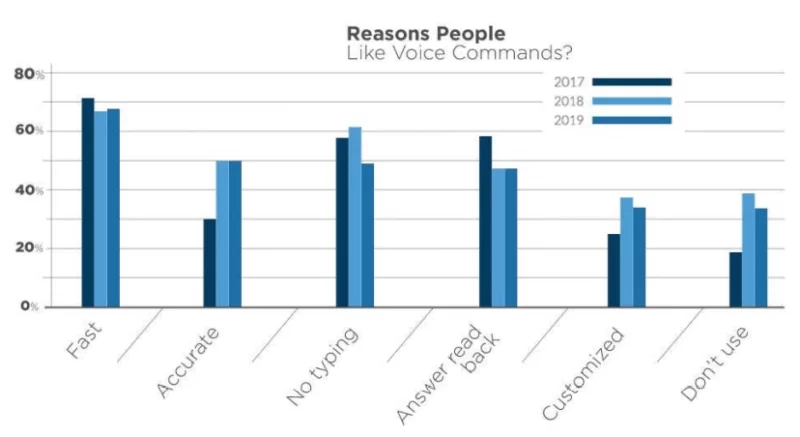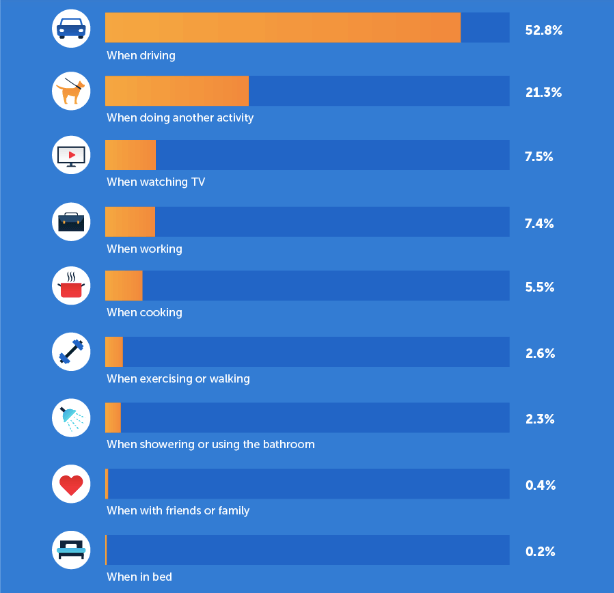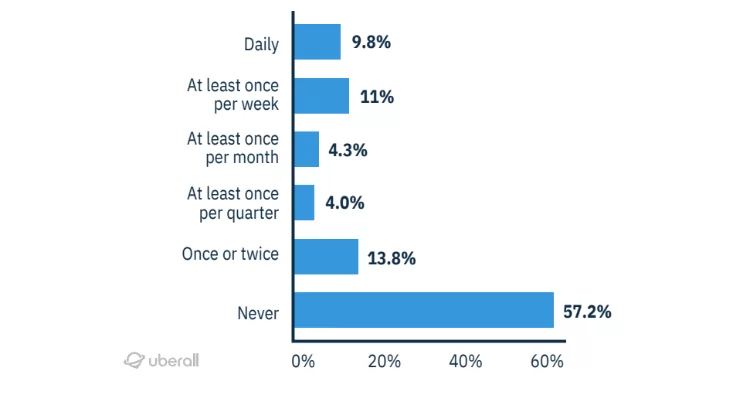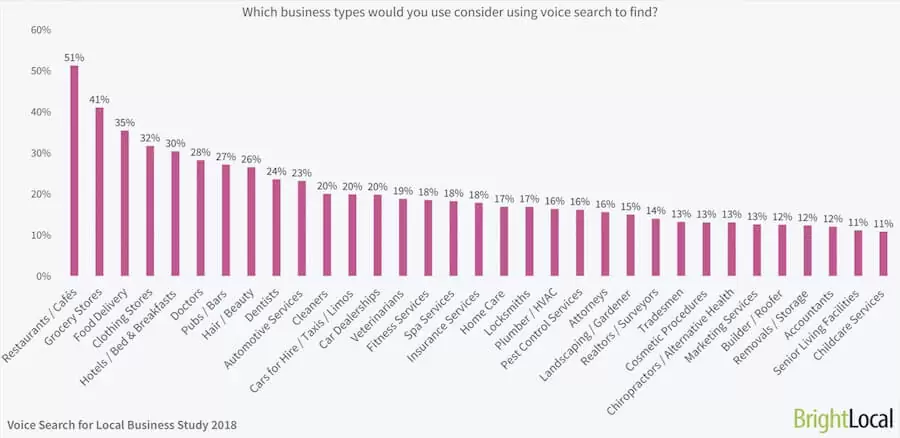Voice search is a speech recognition technology that allows users to search for information by speaking into a microphone. It can be used in various ways, such as allowing users to search the internet, find local businesses, or control smart devices.
Voice Search Trends
Voice search is becoming increasingly popular, with a growing number of devices and apps incorporating this technology. And the number is expected to grow as more people use voice-enabled devices, such as smart speakers and smartphones.
There are a number of factors driving the growth of voice search, including the increasing accuracy of speech recognition technology and the convenience of hands-free searching.
With the release of new voice-enabled devices, such as the Amazon Echo and Google Home, there is also a growing number of people who are comfortable using voice commands to interact with technology.
Implications for Businesses
As voice search becomes more popular, businesses need to consider how this trend will impact their marketing and SEO strategies. One of the key implications is that businesses need to ensure their website content is optimized for voice search.
This means using natural language and long-tail keywords, as well as ensuring that your content is easily accessible on mobile devices.
Another implication is that businesses need to be aware of the growing number of people using voice-enabled devices to search for local businesses.
This means that it’s important to ensure your business is listed on local directories and that your address and contact information is up-to-date.
Key Voice Search Statistics: Editor’s choice
- 52% of voice-based users use it for search while driving.
- 65% of people aged 25 to 49 years use voice assistants.
- 46% of men use voice assistants at least once a month.
- 21% of individuals use voice search at least once a week.
- It takes 4.6 seconds to load a voice search result
1. Since 2018, voice has become users’ priority choice for mobile search.
According to Search Engine Land, the trend of voice search became more popular in the year 2018, and it has dominated text search on smartphones since then. Users prefer voice search because it is fast and n typing needed.

2. More than 50% of people use voice search while driving.
According to Social Media Today, 52% of voice-based users use it for search while driving. It is a hands-free and convenient way to get information without compromising safety.

3. More than 60% of the users aged between 25 to 49 talk to their voice assistants
According to PwC, around 65% of people aged 25 to 49 years use voice assistants. However, the number is significantly higher for people aged between 18 to 24 years which is about 75%.

4. More men than women use voice searches at least once per month.
According to Social Media Today, 46% of men use voice assistants at least once a month. The number is lower for women, which is about 26%.
5. Around 21% of individuals use voice search every week.
According to Search Engine Watch, 21% of individuals use voice search at least once a week. The number goes up to 33% for the people aged between 18 and 29 years.

6. Around 50% of buyers now use voice search to explore products online.
According to Social Media Today, voice search is used by 50% of buyers to explore products and services online. The figure goes up to 55% for the people aged between 18 and 45 years.
7. From 2008 to 2016, the voice search surged by 35x
According to Kleiner Perkins, voice search queries have increased by 35x from 2008 to 2016. One of the primary reasons for this shift was affordable smartphones.
8. Around 74% of respondents had taken the help of the voice search.
HubSpot claims that around 74% of the individuals had used voice search to perform various online activities.
9. Google translates more than 60 languages for voice search.
According to Wikipedia, Google Translate supports over 100 languages for voice input. And this number is growing every day with technological advancement and user demand for voice search.
10. It takes around 4.6 seconds to load voice search results.
According to Backlinko’s findings, it takes 4.6 seconds to load a voice search result. The average length of a voice search is around 29 words.
11. More than 70% of the voice results are from HTTPS pages.
According to Backlinko, around 70.4% of the voice results are from HTTPS pages. In addition, it shows that search engines pay more attention to websites running on HTTPS certificates. So, if you don’t have an SSL certificate, now is the time to get one.
12. The average voice search result has less than 30 words.
According to a study by Backlinko, the average voice search result is around 29 words. In addition, the study also found that about 12% of the voice search result featured snippets are longer than 30 words.
13. Websites using Schema markups account for more than 35% of the voice results.
According to a study, around 36.4%, i.e., more than one-third of the voice search results come from Schema markup websites. So, if you want to appear in voice search results, start using Schema markups.
14. Only 10% of the voice search queries are actual questions.
According to Bruce Clay reports, only 10% of the voice search queries are questions. The rest of them are commands, information requests, and general searches. So it’s a valuable insight into how to optimize the content for voice search.
15. A high domain authority website tends to have better voice search rankings.
According to reports, a website with a high domain authority will likely have better voice search rankings. In addition, such websites are considered more credible and trustworthy by search engines.
16. Content with a higher sharing rate ranks well on voice search results.
According to Backlinko, content with a higher sharing rate will likely rank better on voice search results. Thus, it’s essential to create engaging and shareable content.
17. An average voice search result is simple-written that is quick to understand
According to Backlinko, the average voice search result ranking well is written straightforwardly. It is also quick to understand. The language level is around 9th grade which becomes easy for everyone to understand.
18. An average high-ranking voice search results have 1,199 Facebook shares and 44 Tweets.
According to a report, an average voice search result has 1299 Facebook shares and 44 tweets. This number is significantly higher for the desktop results, and it shows that people are more likely to share voice results on social media.
19. Only 13% of all Google searches are from voice searches.
According to the reports of Econsultancy, only 13% of all the searches on Google are from voice searches. The number might be low, but it is overgrowing with the increasing popularity of voice assistants.
20. More than 40% of the answers are from Featured Snippets.
According to a report, 42.5% of the voice answers are from the featured snippet box. This number is significantly higher than the desktop results, only 10%. It shows that voice results are more likely to come from the featured snippet box.
21. An average Google voice search result page has 2312 words.
According to research by Backlinko, the average word count for a voice search result page is 2312. This figure shows the importance of long-form content in SEO and how it can benefit your website in gaining a competitive edge.
22. More than 70% of the voice results rank in the top three on desktop.
According to a report, 75% of voice search results on the desktop rank within the top three positions. Moreover, the effects on the first page get nearly 95% of the total clicks.
23. Dentists are among the top groups that are optimized for voice search.
According to Search Engine Watch, more than 43% of dental practices in the US are optimized for voice search. Moreover, around 61% of them are ready to take voice search appointments.
24. Consumer protection organizations are the least searched on voice commands.
According to Search Engine Watch, “consumer protection organizations” is the term that is searched the least on voice assistants. Moreover, more than 27% of the searchers don’t know if they can use voice search to find consumer protection organizations.
25. An average voice search query is around 4.2 words.
According to Bruce Clay, the average voice search query is 4.2 words. People tend to use little long questions when talking than typing. On the other hand, the average typed query is around 3.2 words.
26. Smartphone-based voice queries are 3X more likely to be for local businesses.
According to Search Engine Watch, voice queries are three times more likely for local businesses. It is because people use voice search to find businesses near them. In addition, voice search is more likely to be used for “near me” searches.
27. Around 20% of the mobile queries are now active voice queries.
According to a report, 20% of the mobile queries on Google are now active voice queries. However, it was only 2% in 2016, which shows a significant rise in the voice search trend.
28. Around 25% of the voice searches made on Windows 10 are through Cortana.
According to Social Media Today, 25% of voice searches on Windows 10 are made through Cortana. Moreover, the number of searches made through Cortana has increased in the past year.
29. More than 60% of the users say voice search is handy during their buying journey.
According to Social Media Today, 61% of the users find voice search useful while looking to make a purchase. The number goes up to 64% for the people aged between 25 and 49 years.
30. Top three places where people keep their voice assistant devices
According to report, the top three places where the majority of people keep their voice assistance devices are the living room (52%), bedroom (25%), and kitchen (22%).
31. Around 24% of Americans own a voice-activated smart speaker.
According to NPR, 24% of Americans own a voice-activated smart speaker. Moreover, the number of smart speaker owners has doubled since 2017.
32. Smart speaker users request around 11 tasks every week.
According to NPR, the average number of tasks requested from smart speakers is around 11 per week. It was a significant increase from 2017 when it was only 6.
33. Around 53% of the smart speaker’s owners feel like they’re talking naturally to a machine.
According to Google, 53% of voice-command-based speaker users feel comfortable and natural talking to a machine.
In addition, about 78% of the users said that their experience with voice-activated assistants is positive.
34. Product buying-related terms are not among the most popular voice searches.
According to Search Engine Land, the product buying-related terms are not the most common voice search. Instead, the most famous voice searches are related to general information, weather, and directions.
35. Around 11.5% of American voice assistant owners claimed they used voice search to buy something once a month.
According to Voicebot, in the US, around 11.5% of people use voice assistants for shopping purposes at least once a month.
36. Around 26% of smart speaker owners have used voice search to buy something at least once
According to Voicebot, 26.1% of smart speaker owners use voice assistants to make a purchase. The number is expected to grow in the coming years as more and more people are using voice-based assistants for their everyday tasks.
37. Around a quarter of smartphone users take the help of voice search to order food.
According to NPR, more than 22% of smartphone users use voice search to place food orders. The number is expected to grow in the coming years as the trend of Voice Search is on the rise.
38. 54% of users wish to have the ability to make reservations using a voice search
According to BrightLocal, 54% of voice-based users want to make restaurant and bar reservations using their voice assistants.

39. Around 51% of users use voice search for “near me” queries.
According to BrightLocal, 51% of search users use it for “near me” searches. Therefore, voice search is convenient for people looking for local businesses and services.
40. Around 90 million Americans own a smart speaker.
According to Voicebot, the number of smart speaker users in the US reached 90 million in 2019. The number is up from 66 million in 2018.





